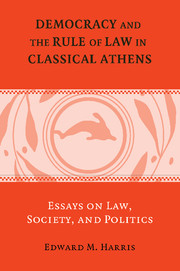Book contents
- Frontmatter
- Contents
- PREFACE
- ACKNOWLEDGMENTS
- ABBREVIATIONS
- INTRODUCTION
- I LAW AND CONSTITUTIONAL HISTORY
- II LAW AND ECONOMY
- 1 Law and Economy in Classical Athens: [Demosthenes] Against Dionysodorus
- 2 When Is a Sale Not a Sale? The Riddle of Athenian Terminology for Real Security Revisited
- 3 Apotimema: Athenian Terminology for Real Security in Leases and Dowry Agreements
- 4 The Liability of Business Partners in Athenian Law: The Dispute between Lycon and Megacleides ([Dem.] 52.20–1)
- 5 Did Solon Abolish Debt-Bondage?
- 6 Notes on a Lead Letter from the Athenian Agora
- III LAW AND THE FAMILY
- IV ASPECTS OF PROCEDURE
- V ENVOI
- BIBLIOGRAPHY
- INDEX LOCORUM
- SUBJECT INDEX
5 - Did Solon Abolish Debt-Bondage?
Published online by Cambridge University Press: 25 February 2010
- Frontmatter
- Contents
- PREFACE
- ACKNOWLEDGMENTS
- ABBREVIATIONS
- INTRODUCTION
- I LAW AND CONSTITUTIONAL HISTORY
- II LAW AND ECONOMY
- 1 Law and Economy in Classical Athens: [Demosthenes] Against Dionysodorus
- 2 When Is a Sale Not a Sale? The Riddle of Athenian Terminology for Real Security Revisited
- 3 Apotimema: Athenian Terminology for Real Security in Leases and Dowry Agreements
- 4 The Liability of Business Partners in Athenian Law: The Dispute between Lycon and Megacleides ([Dem.] 52.20–1)
- 5 Did Solon Abolish Debt-Bondage?
- 6 Notes on a Lead Letter from the Athenian Agora
- III LAW AND THE FAMILY
- IV ASPECTS OF PROCEDURE
- V ENVOI
- BIBLIOGRAPHY
- INDEX LOCORUM
- SUBJECT INDEX
Summary
the constitution of the athenians aattributed to aristotle informs us in several places that Solon abolished the practice of “lending on the [security of the] body” (δανεíζειν ἐπì τοĩς σώμασι). Several scholars have recently interpreted this to mean that Solon abolished the practice of debt-bondage. M. I. Finley believed that as a result of Solon's reforms “debt-bondage was abolished tout court.” Elsewhere Finley asserted “The Solonic revolution in Athens brought an end to debt-bondage” and also interpreted a major fragment of Solon's poetry (fr. 36 [West]) as a description of this reform. G. E. M. de Ste. Croix often disagreed with Finley, but on this point he did not differ: in his opinion, Solon “forbade for the future not merely enslavement for debt but also any kind of debt-bondage by the simple expedient of prohibiting the giving of the body as security.” This view has been accepted without question by several scholars such as Ober and by Patterson.
In this article I will argue that Solon did not abolish debt-bondage, but only enslavement for debt. Section I will analyze the difference between enslavement for debt and debt-bondage. Section II will examine the terminology used by Aristotle to describe Solon's reform and show that the law concerns enslavement for debt, not debt-bondage. Section III will provide evidence to show that debt-bondage continued to exist in Classical Athens long after Solon. Section IV will show that Solon's poetry reveals that the lawgiver was concerned about enslavement resulting from violence and raids for booty, not about debt-bondage that had come about because of a certain system of land tenure.
- Type
- Chapter
- Information
- Democracy and the Rule of Law in Classical AthensEssays on Law, Society, and Politics, pp. 249 - 270Publisher: Cambridge University PressPrint publication year: 2006



